- Home
- Tim LaHaye
Mark of Evil Page 9
Mark of Evil Read online
Page 9
Majority Leader Atchison held out his hand to seal the deal with Tulrude. “That’s a discussion for another day. Today we have a bigger mission: the beginning of the end for President Hank Hewbright and his dangerous, self-righteous presidency.”
FIFTEEN
LEIDEN UNIVERSITY
Leiden, The Netherlands
Something was wrong. Pack McHenry felt it in his gut. He glanced at his Allfone watch to check the time. He stood in the glass-enclosed vestibule outside the law school auditorium where Professor Luxendorf’s next class, the Law of Internet Technology, was scheduled to begin in five minutes. His students were already starting to parade into the class. Pack wondered if Luxendorf would make it to their agreed rendezvous. When the professor had called Pack back, he’d said yes, he would meet with him, but he insisted that it be a very public place. Specifically, outside the law school lecture hall after one of his classes. He’d invited Pack to come early and sit through the class if he liked. Pack had taken him up on the offer.
The former CIA clandestine operations chief ran his fingers through a few unruly strands in his salt-and-pepper hair, then checked the time again. Students now streamed into the classroom in droves. But no Professor Luxendorf. Pack touched the security imprint icon on the face of his Allfone and spoke into it. The voice audiogram verification flashed Voice ready.
Pack spoke into his watch. “Please video call Dragon Lady.”
It rang twice, and then the face of his wife, Victoria—a classic platinum blond and still beautiful at age fifty-two—flashed onto the dial of his Allfone. She smiled. “I see you’re still using that terrible speed-dial name for me. Pack, dear, reeeeally . . .”
“Honey, we may have a problem. Are you somewhere near Luxendorf’s house?”
Victoria was already on it. “When I didn’t get confirmation from you ten minutes ago that the meeting was in progress, I drove over here. I’m just pulling up in front of his little cottage right now. Lots of pretty tulips in the front garden, by the way. Give me a sec.”
Victoria’s image was replaced by the words Video off. A few minutes went by before her face appeared again. She whispered, barely audible. “I’m inside. I zapped the digital lock on his front door. My keypad meter tells me that someone eventually got in through the lock before me, but it was someone who didn’t know the code.”
“Oh?”
“The lock memory says that they tried multiple variations before they hit the correct code. Probably using a portable clue randomizer. These guys weren’t here just to steal a big-screen web TV or heist the silverware, that’s for sure. I’ve got a bad feeling.”
“Be careful, Vicky.”
“Always. Just remember, dear, I have that innocent, helpless look that always fools the bad guys. But I’ve also got my semiautomatic with me. And as you will recall, at the shooting range, between the two of us, I’m the better—”
She stopped talking. Pack tensed and began to walk farther away from the lecture hall, which was now filled to capacity but with no lecturer, as the din from student conversation reached a dull roar. “What is it, Vicky?”
“They’ve sacked the place. Stuff all over. I have to find out where Luxendorf was hiding it.”
“Have they exited the house?”
“Oh yes, they’re gone. Besides, I uploaded the digital code history from the electronic door lock. It showed that it was last shut from the outside. Give me a minute, dear.”
She disappeared again, but for two minutes this time, while Pack paced rigidly. The class in the law school was getting restless and noisier. A few students started walking out of class.
Then, “Okay, Pack. Luxendorf kept it in a safe on the wall, behind a painting. Gee, poor guy. Could he have been any more predictable?”
“Is it still secure?”
“Hardly. The safe is wide open and empty. No signs of forced entry.”
“Which says something bad about the fate of our law professor.”
“I’m going into another room,” Victoria said. “Looks like his study.”
One more minute before she described the inevitable. “Pack, I’ve located Professor Luxendorf. He’s lying on the floor. He’s been murdered.”
SOMEWHERE IN THE PACIFIC
Ethan March stood on the deck of a Greek cargo ship, courtesy of Nick, the international travel guru. The most discreet way to cross an ocean, particularly for a wanted man like Ethan, was still the old-fashioned way: by ocean-going freighter. He anticipated a series of jokes from his associates about his taking a “slow boat to China” now that he was on his way to Hong Kong, hopefully to a meeting with Jo Li.
The moon was out and nearly full, huge in the black night sky, sending a narrow trail of light to gild the waves of the ocean. Ethan enjoyed a rare moment of peace and quiet. But his mind continued on rapid fire.
That night he had received a call from Pack McHenry explaining all about the killing of Dr. Luxendorf, ICANN code cardholder number six. He’d asked Pack the obvious question: “What’s the motive behind this?” The intelligence veteran didn’t have an answer.
So Ethan decided to call one guy who might. He had forgotten about the time change. A few minutes later he had a sleepy Chiro Hashimoto on the line. It was dawn in the Yukon and he had rousted Chiro from his bed.
“Chiro, Ethan here. I’ve got a question for you. Let’s assume that someone wants to shut down the Internet. Completely. From one corner of the plant to the other.”
Chiro yawned on the other end. “Uh . . . okay. So why are they doing it again? To make some technical correction? Purging some kind of global, exponential virus?”
“No, let’s assume it’s nothing like that.”
“Well, are they trying to destroy the Internet? Nihilistic attack on all the networks?”
“No, I’m sure they’re not. These people are after the ability to shut the Internet down, then reboot it again.”
Chiro fired back the answer. “Oh. Well, that’s easy, then. They’re going to reprogram the Internet for another use. Sort of like upgrades to your Allfone or your AllView device. You know, like they used to do to computer laptops in the old days.”
“ ‘Another use.’ Like . . .”
“Well, the web has been used up to now pretty much as an open-ended, interactive kind of communication network among people around the world. Receiving information. Transmitting data. Back and forth between people and entities. Two-way communication. I’ve been thinking about our project, watching what is happening with Alexander Colliquin’s Internet research in New Babylon. If Colliquin is the one behind it, then I can think of one reason to take down the Internet and then reboot it again.”
“Which is . . .”
“Changing its use into a one-way communications and personal stimulus-and-input network. Global behavior modification. He would need a massive rebooting if he wanted to reach the entire human race with that kind of system.”
Chiro fell silent. Ethan knew his friend’s mind was running down some kind of digital maze, putting together a scenario. After almost a full minute, Chiro added, “I’ve been preparing our communications center up here to counter, or maybe even hack into, Colliquin’s new imagery network. But I’ve had to keep it loose—open to a couple of options. Our intelligence about his plan has been coming to us in tiny little bits. But now . . . with what you’re telling me . . .” Chiro went silent again for a few seconds. “If he were to reprogram the web with a behavioral-stimulus kind of program and his people connect it to the global BIDTag grid . . . Then once he rebooted the Internet . . . it would put Colliquin in control.”
“Meaning . . . ?”
“Control of everyone, Ethan. I am talking . . . everyone.”
SIXTEEN
NEW BABYLON, IRAQ
The setting was deceptively calm. At a large semicircular table in the center of the cavernous chambers of the World Parliament of the Global Alliance, ten regents sat in their executive chairs, warmed by the glow of environmen
tally perfect lighting. The tone of the meeting in the great hall of white stone trimmed in mahogany had been perfunctory and smoothly administrative. But everyone in the room knew that a crisis was underfoot. The worldwide economic depression had created a frantic urgency behind the creation of the World Parliament in the first place. Nations were desperate for a financial fix, and Alexander Colliquin’s new governing architecture was hailed as a lifeline thrown to a drowning world just in the nick of time.
Nine of those present were permanent representatives of their respective international regions—each region comprised of numerous nations and in some cases an entire continent. Yet one of the regents was there by temporary appointment—Jessica Tulrude, who represented Region One, the North American sector. The universal wisdom was that the inclusion of the United States into Region One, thus joining it with Canada and Mexico, was crucial to the long-term survival of the Alliance.
Alexander Colliquin had been authorized as chancellor of the Alliance to make Tulrude’s temporary appointment. It fit, he said, into the category of “emergency circumstances.” Colliquin had determined that the dispute between President Hewbright and the Senate over America’s membership in Region One of the Alliance qualified as that. None of the other regents had the desire, or the stomach, to dispute Colliquin’s move. Under the rules, though, Tulrude’s temporary appointment could last for only six months, and at this point there were only two months left. Something drastic would have to be done to break the deadlock in Washington and bring the U.S. into the fold.
Of course, when Tulrude completed the term of the disabled president Virgil Corland, but then failed to capture the White House in her own right when she was trounced by Hewbright in the next election, Colliquin’s closest advisors tried to dismiss her as a flawed geopolitical asset. They wanted someone else as regent. But not Colliquin. He had a particular skill the others did not: a deep understanding of human motivations, failings, and temptations that empowered him to see into the hidden things, the secret, shadowy parts of people. And he had seen into Tulrude. He alone recognized that her election failure had wounded her, but not fatally, and made her more dangerous to her opponents. And more loyal to Colliquin. On the other hand, only Colliquin and a very few others would ever know that in the final analysis, Tulrude was not the most important chess piece on the board. The ultimate endgame did not really depend on Jessica Tulrude, but would in fact require another.
Colliquin was settled into his throne-like chancellor’s chair, which was off to the side and set above the regents’ table, where he was bathed in a golden spotlight of his own. A moment later the secretary of the World Parliament began to read the motion currently on the floor for a vote.
Be it resolved that, in light of the defiance by the president of the United States to the rule of law, the Global Alliance and all the nations therein shall impose economic sanctions against the United States of America and shall refuse all trade, economic support, loans, or loan guarantees to the same and shall freeze all American assets held within the Global Alliance until such time as the United States shall formally and irrevocably enter the Global Alliance in accord with the vote of the United States Senate.
The secretary then called for the vote. Seven affirmative votes were needed for a sanction. Colliquin remained confident, even though Canada had wavered up to the very end.
The little lightbulbs in front of each of the regents flashed on. Eight greens, one more than needed. However, two of the lights burned red. Alexander Colliquin glared at the no votes. They came from the two regions that included England and Australia.
Colliquin growled under his breath. “England and Australia. Always those two. And Canada . . . My god, they almost voted with them.”
When the session ended, Colliquin strutted out of the Parliament chambers and into the back of his Bentley stretch limo. It would take him to the chancellor’s palace in the center of the one-hundred-square-mile compound known as New Babylon. The area had become a global capital of lavish white stone Alliance government buildings, gleaming skyscrapers housing a thousand of the world’s largest international commercial headquarters, and the five-hundred-acre One Movement All Faiths Center, the universal headquarters for the world’s religious faiths headed by bishop Dibold Kora.
Some quiet objections had been raised in the beginning by a few countries over the New Babylon name, given its historical connotations. So the official name for the capital was changed to New World City. But in private conversation Colliquin still clung persistently, almost obsessively, to the name New Babylon, and he insisted that his personal staff do the same.
Chancellor Colliquin had experienced a technical victory just now, but it wasn’t complete. He simmered as his limo eased down the long two-mile lane leading to the circular drive and twenty-foot-high brass-engraved entrance doors of the chancellor’s palace. He tapped the microphone function on the ostrich-skin console next to him and yelled, “Pick up the pace!” to his driver.
An armed security detail met Colliquin as he rushed in through the burnished front doors that were decorated with reliefs of mythic Babylonian sphinxes. Once he was up in the personal penthouse that adjoined his executive working suite of offices, he summoned Ho Zhu, his deputy. By the time Ho arrived, Colliquin had cooled a bit.
“Congratulations, Chancellor,” Ho began, “on the vote today for sanctions against America—”
But Colliquin cut through the pleasantries. “How close are we in preparations for the computer data center for our global network link?”
“Henry Bender, my New Jersey contact, says he’s close to getting—”
“I don’t want names!” Colliquin shouted. “No names of your contacts, ever!”
Ho gave a short half bow and picked up where he’d left off. “We are close to getting the passwords and codes for the Utah data center’s central command operating system.”
“We need them in days, not weeks, and certainly not months.”
And Ho bowed again.
As he lounged in his sofa chair, Colliquin rubbed his thumb over the back of his big ring. The ornate piece of jewelry bore the image of a ruby-eyed solid-gold serpent swallowing its own tail. “And what about Hewbright?” he asked.
“Regent Tulrude assures me that the House will impeach the president, and the Senate will convict him and remove him from office.”
Colliquin stopped fingering his ring and stared Ho in the eye with an exasperated expression. “No. Not that. I mean the other thing.”
“Oh yes, our default position. It’s all in place. Our White House person is on standby.”
“Then there’s only one more area of concern.”
“Yes, Your Excellency?”
“The Remnant. They are poisoning our influence in most of our Alliance nations, like a toxin. Their numbers are spreading. So we need to increase our pressure on their global leadership.”
“Yes, Chancellor.”
“And I’d like to have my office updated with photos of the key Remnant leaders . . .”
“Certainly. As soon as we resolve a small computer program glitch.”
“Glitch?”
“A few have had their facial metrics loaded into the onboard computers in our drone-bots, but for some reason we have been unable to download the metrics back into our system to print photo arrays.”
“Are you telling me our drones can recognize them from the sky, but we don’t have pictures of them here on the ground?”
“I am afraid that is true. But for only a few of them.”
Colliquin fumed. “Please tell me that Ethan March’s photo has been distributed to every Alliance outpost on the planet.”
“Before our drone program was expanded, we handed out hard copies of his photo to a few bounty hunter groups. Since then we’ve gone digital, and we just assumed we could retrieve all the images back from the drones. But I’m afraid he’s one of a few whose images can’t be downloaded due to the glitch—”
“What kind of
operation are you running? Solve this computer problem! I want Ethan March. You do remember him? The protégée of Joshua Jordan. Public enemy number one. Start with him. He’s at the top. Whatever it takes. Strike the shepherd first. Then we go after the sheep.”
SEVENTEEN
HONG KONG
When Rivka stopped by her little efficiency apartment to check on Meifeng, she found her still in the middle of one of her school lessons. The former call girl was now being tutored in some basic classes by a local member of the Remnant, a retired teacher Rivka had hired.
“Doing okay?” Rivka asked as she stood in the doorway.
Meifeng’s face was full of life, and she had color in her checks now that her body was no longer laced with drugs from Chow, her former pimp. She brightened, looked up from her book, and smiled. “Doing swell, Miss Riv.”
“Fine,” Rivka said. “I’m stopping by the market. Be back in a jiffy.”
After Rivka left her apartment, she took a meandering route through several alleys and backstreets and cut through the lobbies of two hotels. She never took the same route on her short travels to the little corner market. Just a matter of habit from her years as a former Israeli spy.
The little grocery had a good supply of fresh fruits, vegetables, and fish. She was looking over a tray of celery, noodles, and watercress when she heard a familiar voice. And when she did, she momentarily forgot the rest of the items on her shopping list.
“So, are you inviting me to dinner?”
She turned to face Ethan March. He was grinning back at her. Ethan added, “You always could make a really great chop suey. In fact, as I remember it, that was the last meal we had together.”
Rivka tried not to brighten too much. “You’re right, it was. My place in Tel Aviv.”

 Glorious Appearing: The End of Days
Glorious Appearing: The End of Days Left Behind: A Novel of the Earth's Last Days
Left Behind: A Novel of the Earth's Last Days Kingdom Come: The Final Victory
Kingdom Come: The Final Victory Nicolae: The Rise of Antichrist
Nicolae: The Rise of Antichrist Desecration: Antichrist Takes the Throne
Desecration: Antichrist Takes the Throne Mark's Story: The Gospel According to Peter
Mark's Story: The Gospel According to Peter Babylon Rising
Babylon Rising Thunder of Heaven: A Joshua Jordan Novel
Thunder of Heaven: A Joshua Jordan Novel The Edge of Darkness
The Edge of Darkness Apollyon: The Destroyer Is Unleashed
Apollyon: The Destroyer Is Unleashed Armageddon: The Cosmic Battle of the Ages
Armageddon: The Cosmic Battle of the Ages Soul Harvest: The World Takes Sides
Soul Harvest: The World Takes Sides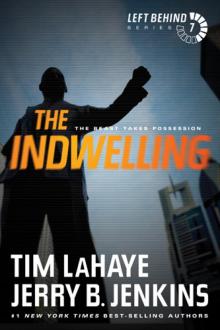 The Indwelling: The Beast Takes Possession
The Indwelling: The Beast Takes Possession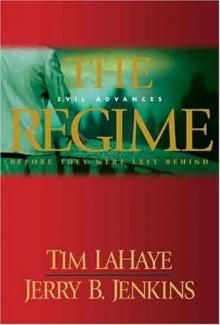 The Regime: Evil Advances
The Regime: Evil Advances The Rapture: In the Twinkling of an Eye / Countdown to the Earth's Last Days
The Rapture: In the Twinkling of an Eye / Countdown to the Earth's Last Days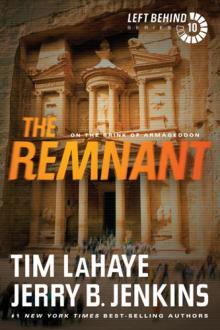 The Remnant: On the Brink of Armageddon
The Remnant: On the Brink of Armageddon John's Story: The Last Eyewitness
John's Story: The Last Eyewitness The Europa Conspiracy
The Europa Conspiracy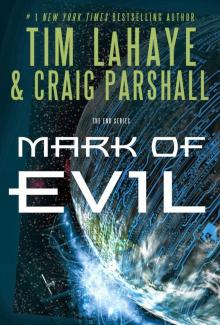 Mark of Evil
Mark of Evil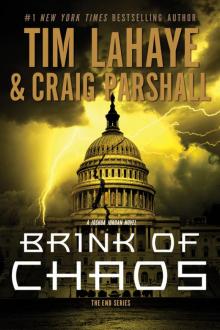 Brink of Chaos
Brink of Chaos The Mark: The Beast Rules the World
The Mark: The Beast Rules the World 04 The Edge of Darkness
04 The Edge of Darkness The Rising: Antichrist is Born / Before They Were Left Behind
The Rising: Antichrist is Born / Before They Were Left Behind Babylon Rising: The Edge of Darkness
Babylon Rising: The Edge of Darkness 03 The Europa Conspiracy
03 The Europa Conspiracy Desecration
Desecration Left Behind
Left Behind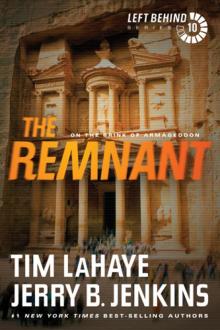 The Remnant
The Remnant Soul Harvest
Soul Harvest Left Behind Book 13: Kingdom Come The Final Victory
Left Behind Book 13: Kingdom Come The Final Victory Apollyon
Apollyon 02 Thunder of Heaven: A Joshua Jordan Novel
02 Thunder of Heaven: A Joshua Jordan Novel Glorious Appearing
Glorious Appearing The Rapture: Evil Advances / Before They Were Left Behind
The Rapture: Evil Advances / Before They Were Left Behind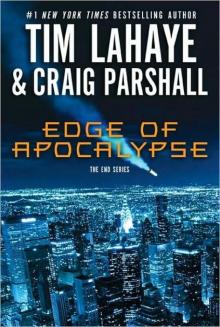 Edge of Apocalypse
Edge of Apocalypse Tribulation Force
Tribulation Force The Left Behind Collection: All 12 Books
The Left Behind Collection: All 12 Books Black Friday
Black Friday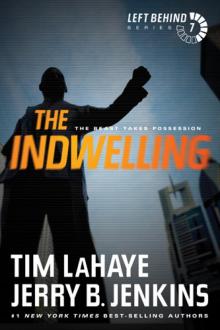 The Indwelling
The Indwelling The Left Behind Collection
The Left Behind Collection